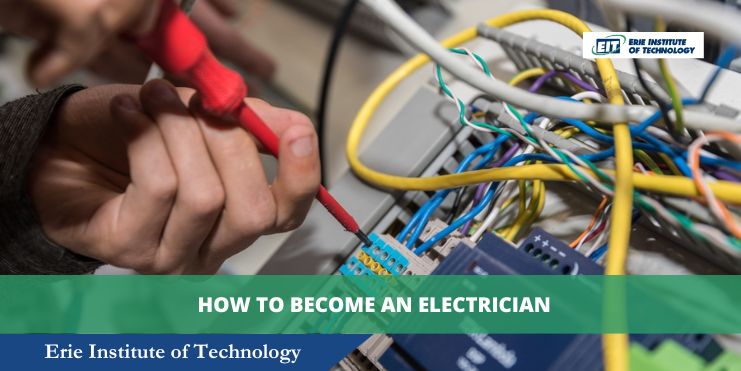It’s everywhere. Electricity is a naturally occurring energy source generated by matter in motion. Almost magical, we harness the flow of electrons at an atomic level to power our modern utilities and amenities. Okay, it’s not magic — it’s science. And like any science, working with electricity requires observation and technical knowledge. Those who work with electricity are called ‘electricians,” and they play a major role in sustaining modern life by keeping the lights on. Becoming an electrician means taking on a vital responsibility.
Without them, we wouldn’t be able to fall asleep to our favorite television shows and wake up to our phone alarms; we’d have to wait 15 minutes to reheat our morning coffee by fire instead of 15 seconds by microwave. Luxuries aside, electricians also install the machines that manufacture life-saving medical devices. If the power goes down in the hospitals that use these devices, they repair it.
Thinking about pursuing a career as an electrician? Your future is bright. In the following guide, we will explain how to become an electrician and explore why this rewarding profession is also one of the most in-demand careers.
What Does an Electrician Do?
Electricians are skilled trade professionals who play a critical role in maintaining the electrical infrastructure that powers our daily lives. Their core responsibilities include installing, maintaining, and repairing electrical systems in our homes, businesses, and industrial facilities.
- Residential Electricians install, repair, and maintain electrical systems in residential settings — such as homes, condos, and small apartment buildings.
- Commercial Electricians handle more complex electrical systems and specialize in business and commercial buildings. They must be well-versed in the distinct power requirements of commercial spaces, which differ significantly from residential ones.
- Industrial Electricians manage the electrical systems that power heavy machinery in large facilities like manufacturing plants, power stations, and chemical processing centers. This type of work requires advanced, specialized training.
In addition to their primary specializations, electricians have the opportunity to advance through several professional rankings:
Journey-Level Electricians: These are licensed professionals who have completed an apprenticeship. They can work independently, but they cannot lead job sites or train apprentices.
Master Electricians: With additional experience and licensing, master electricians can lead teams, train apprentices, and oversee complex projects.
Independent Electrical Contractors: Essentially small business owners, independent electricians hire and manage their teams. Becoming an independent electrician requires advanced business and electrical expertise.
Why Choose a Career as an Electrician?
Becoming an electrician offers compelling advantages that make it an attractive career path for those seeking a dynamic and rewarding job.
- Immediate Earning Potential
Unlike many careers that require extensive and expensive schooling, electrician apprenticeships allow you to earn while you learn. These four-year programs provide approximately 8,000 hours of hands-on and classroom training without accumulating student loan debt.
- Strong Job Market
The demand for skilled electricians continues to grow. According to recent data from the Bureau of Labor Statistics, electrician employment is projected to increase by 11% from 2023 to 2033, indicating a stable job market that is growing faster than those of other occupations.
- Competitive Compensation
With competitive wages and continuous advancement opportunities, electricians enjoy an attractive earning potential.
- Dynamic Work Environment
Unlike traditional desk jobs, electricians work hands-on. Each day brings new challenges and opportunities to solve complex problems in different settings.
- STEM Career Pathway
Electrical work is a rewarding and in-demand STEM (science, technology, engineering, and math) career, contributing directly to technological infrastructure and innovation.
- Entrepreneurial Opportunities
With experience, electricians can become independent contractors or start their businesses, offering additional career flexibility and potential for growth.
Steps to Becoming an Electrician
1. Earn a High School Diploma or GED
The crucial first step in becoming an electrician is earning a high school diploma or equivalent. While the job focuses on specific industry skills, academic foundations are critical. For example, electricians regularly use mathematics:
- Algebra is used to calculate electrical currents
- Trigonometry is used for measuring circuit angles
- Precise geometric calculations are required for designing electrical systems
2. Consider Trade School or Vocational Training
Although not mandatory, attending trade school before your apprenticeship provides significant benefits:
- Comprehensive lab-based and classroom training
- Foundational electrical principles
- Potential job placement assistance
- Credit toward licensing requirements
Most states allow students to substitute formal education for apprenticeship hours. Typically, one year of education can count for 1,000 hours of on-the-job experience, with a maximum of 2,000 hours (two years) of substitution.
3. Consider Licensing and Certifications
Licensing requirements vary by state but generally involve:
- Demonstrating comprehensive understanding of:
- Electrical concepts
- Safety protocols
- Building codes
- Possibly proving completion of apprenticeship
Skills and Qualities of a Successful Electrician
Becoming an electrician requires a unique blend of technical knowledge, physical capabilities, and personal attributes.
Technical Expertise
- In-depth understanding of electrical systems, circuits, and wiring
- Ability to read and interpret electrical blueprints and schematics
- Comprehensive knowledge of electrical codes and safety regulations
Physical Capabilities
- Excellent hand-eye coordination for working precisely with delicate components
- Physical fitness to climb ladders, work in confined spaces, and handle heavy equipment
- Stamina to work long hours in potentially challenging physical conditions
Cognitive Skills
- Strong problem-solving abilities to diagnose and resolve complex electrical issues
- Critical thinking to develop effective solutions quickly and efficiently
- Adaptability to learn and apply new technologies and techniques
Personal Attributes
- Strict commitment to safety protocols
- Attention to detail in every aspect of electrical work
- Clear communication skills for interacting with clients and team members
- Professional demeanor for customer satisfaction
Career Advancement & Specialization
Master Electrician Pathway
After reaching the journey level, electricians can advance to master electrician status and acquire the ability to train apprentices, seek advanced job opportunities, and reach higher earning potentials. To become a master electrician, you must possess at least two years of experience and pass state-specific licensing exams.
Specialized Career Pathways
Electricians can specialize in cutting-edge fields, positioning them at the forefront of technological innovations that contribute to sustainable energy solutions.
- Renewable Energy
- Solar panel installation
- Electric vehicle charging infrastructure
- Smart Home Technology
- Industrial Automation
- Advanced Environmental Systems
Entrepreneurial Pathways
If they choose, experienced electricians can become independent contractors, start their businesses, or offer specialized consulting services.
Power Up Your Career with Our Comprehensive Electrician Course
Empower your future with our comprehensive Electrician course. Enroll now and spark your career in the energy sector!
Get Started with the Electrician Program at Erie Institute of Technology Today
The Electrician Program at Erie Institute of Technology offers a direct path to a super-charged career. Unlike traditional university education, EIT’s skilled trade program provides:
- Focused, hands-on training in specific electrical skills
- Shorter program duration (15 months)
- Lower cost compared to university programs
- Direct pathways to employment
Become an Electrician at the Erie Institute of Technology
Upon completing EIT’s Electrician Program, you’ll be prepared for entry-level positions including:
- Electrician
- Electrical Technician
- Electrical Maintenance Technician
- Utility Technician
Electrician Program Highlights
- Comprehensive training in residential, commercial, and industrial electrical systems
- Mastery of national electrical code requirements
- Hands-on tool and system installation training
- Practical skills for immediate workforce entry
Your future in electrical technology begins at Erie Institute of Technology. Transform your career potential with specialized, industry-driven training that prepares you for success in the electrical field. Take the next step in becoming an electrician and request program information today!

Ross Aresco
CFO
Ross Aresco is the CFO of Erie Institute of Technology. Erie Institute of Technology (EIT) is an Erie Pennsylvania technical/trade school providing training programs for medical, computer, electronics, manufacturing, and technology careers. EIT offers programs in many different areas to suit your interests and talents.

